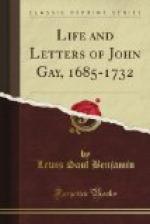[Footnote 13: Stepson of Addison.]
[Footnote 14: Spence: Anecdotes (ed. Singer), p. 149.]
[Footnote 15: Life of Pope, p. 126.]
[Footnote 16: Life of Pope, p. 126.]
[Footnote 17: Cibber’s Apology (ed. Lowe).]
[Footnote 18: Pope: Works (ed. Elwin and Courthope), VI, p. 244.]
[Footnote 19: Daughter of Lord Gerard, widow of the Duke of Hamilton, who in 1712 was killed in a duel with Lord Mohun.]
[Footnote 20: Pope: Works (ed. Elwin and Courthope) VII. p. 420.]
[Footnote 21: B.M., Add MSS., 22626, f. 22.]
CHAPTER VI
1720
“Poems on Several
Occasions”—Gay Invests His Earnings
in the South
Sea Company—The
South Sea “Bubble” Breaks, and Gay Loses
all His
Money—Appointed
a Commissioner of the State Lottery—Lord
Lincoln
Gives Him an Apartment
in Whitehall—At Tunbridge
Wells—Correspondence
with Mrs. Howard.
Gay in 1720 was in his thirty-fifth year, and he had commenced author some twelve years before this date. During this period his output had been very small, and his success not conspicuous. As a dramatist he had been a complete failure—his first play, “The Wife of Bath,” was still-born, and the others, “The What D’ye Call It” and “Three Hours After Marriage,” had practically been hooted off the stage, and had brought him in their train a considerable degree of unpopularity. Of his poems, the only ones of any marked merit were “The Shepherd’s Week,” and “Trivia,” and even these were unambitious, though not without merit. Gay now bethought him of collecting his poems, published and unpublished, and they were issued in two quarto volumes early in 1720, with the joint imprint of Jacob Tonson and his old publisher, Bernard Lintott, and with a frontispiece by William Kent.
The “Poems on Several Occasions,” as the collection was styled, were issued by subscription. His friends supported him admirably. Lord Burlington and Lord Chandos each put down his name for fifty copies, Lord Bathurst for ten copies; in all Gay made more than L1,000 by the publication. To this success he alluded in his “Epistle to the Right Honourable Paul Methuen, Esq."[1]
Yet there are ways for authors to be great;
Write ranc’rous libels to reform
the State;
Or if you choose more sun and readier
ways,
Spatter a minister with fulsome praise:
Launch out with freedom, flatter him enough;
Fear not, all men are dedication-proof.
Be bolder yet, you must go farther still,
Dip deep in gall thy mercenary quill.
He who his pen in party quarrels draws,
Lists an hired bravo to support the cause;
He must indulge his patron’s hate
and spleen,
And stab the fame of those he ne’er
has seen.
Why then should authors mourn their desp’rate
case?
Be brave, do this, and then demand a place.
Why art thou poor? exert the gifts to
rise,
And vanish tim’rous virtue from
thy eyes.




